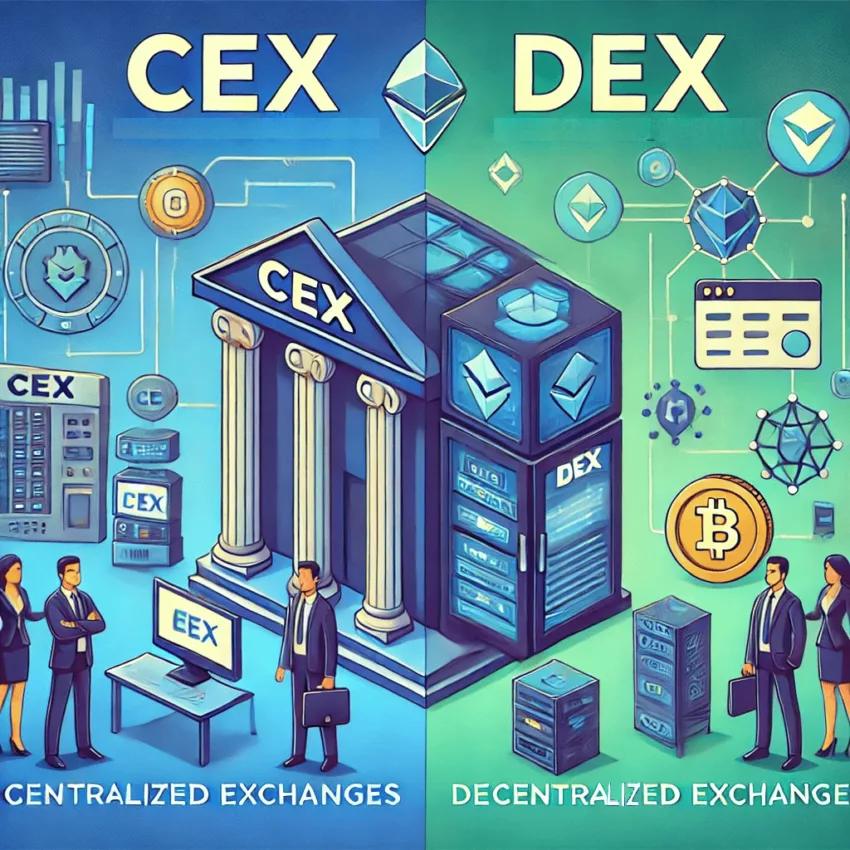Let’s talk about cryptocurrency – a term I briefly covered in my previous post on Blockchain Terminology. Cryptocurrencies are digital assets that you can trade freely. But where do these trades happen? The answer lies in two key platforms: CEX and DEX!
Before diving in, a quick reminder: this post is Not Financial Advice (NFA) but purely for knowledge-sharing purposes. Now, let’s get started!
Cryptocurrency trading revolves around two types of exchanges: Centralized Exchanges (CEX) and Decentralized Exchanges (DEX). While both serve as platforms for buying, selling, and trading digital assets, they operate on fundamentally different principles. Understanding the pros, cons, and use cases of each is essential for navigating the crypto world.
So, let’s break it down!
What is a CEX?
CEX, or Centralized Exchange, is like a traditional stock exchange, but for cryptocurrencies. Popular platforms like Binance, Coinbase, Bybit and OKX are all CEXs.
How CEX Works
Think of a CEX as a middleman. You deposit your funds into the exchange, and it manages transactions on your behalf. It’s convenient and user-friendly, but it’s centralized, meaning the exchange controls your funds and data.
Pros of CEX
- Ease of Use: Perfect for beginners with intuitive interfaces.
- High Liquidity: Faster transactions and better prices due to high trading volumes.
- Advanced Features: Margin trading, staking, futures, and more.
- Customer Support: Dedicated help for troubleshooting.
Cons of CEX
- Lack of Control: “Not your keys, not your coins.” The exchange holds your funds.
- Vulnerability to Hacks: Centralized servers are prime targets for cyberattacks.
- Regulation Risks: Subject to government policies and can freeze assets.
What is a DEX?
DEX, or Decentralized Exchange, is the rebellious cousin of CEX. It operates without a central authority, allowing users to trade directly with each other. Examples include Uniswap, PancakeSwap, and SushiSwap.
How DEX Works
DEXs are powered by blockchain technology and smart contracts. Users connect their wallets and trade peer-to-peer, with no need to deposit funds into the platform.
Pros of DEX
- Full Control: You own your private keys and funds.
- Privacy: No KYC (Know Your Customer) requirements; your identity stays hidden.
- Global Accessibility: No restrictions based on location or regulations.
- Innovation: Cutting-edge features like liquidity pools and yield farming.
Cons of DEX
- Complexity: Not beginner-friendly; requires knowledge of wallets and gas fees.
- Lower Liquidity: Can lead to price slippage, especially for large trades.
- No Customer Support: If something goes wrong, you’re on your own.
- Gas Fees: On some blockchains (like Ethereum), fees can be high during peak times.
CEX vs. DEX: Head-to-Head
| Feature | CEX | DEX |
|---|---|---|
| Ease of Use | Beginner-friendly | Requires technical knowledge |
| Control | Funds controlled by exchange | Users retain full control |
| Security | Vulnerable to hacks | More secure (if you manage your keys) |
| Liquidity | High liquidity | Lower liquidity |
| Privacy | Requires KYC | No KYC |
| Innovation | Traditional trading features | Cutting-edge DeFi tools |
| Fees | Fixed and predictable | Can vary (gas fees) |
Which One Should You Choose?
The choice between CEX and DEX depends on your needs and experience level:
- Choose CEX if:
- You’re new to crypto and need a simple interface.
- You prefer customer support and high liquidity.
- You’re looking to trade large amounts without price slippage.
- Choose DEX if:
- You value privacy and full control of your funds.
- You’re comfortable with blockchain technology and DeFi tools.
- You want to explore innovative features like yield farming.
A Fun Analogy: The Grocery Store vs. Farmers’ Market
Imagine CEX as a big grocery store. It’s convenient, everything’s organized, and you have staff to help. But the store controls what’s on the shelves and how it operates.
Now, think of DEX as a farmers’ market. You deal directly with sellers, get fresh produce, and avoid the middleman. However, you’ll need to know what you’re looking for and be prepared to navigate the hustle and bustle.
Final Thoughts
CEX and DEX each have their strengths and weaknesses. While CEX offers convenience and liquidity, DEX champions privacy and decentralization. The crypto world is vast, and understanding these platforms will empower you to make informed decisions.
Stay tuned for our next post, where we’ll explore the most popular CEXs and DEXs in detail. Until then, happy learning!🚀
Previous Post: Coin vs. Token: What’s the Difference?
Next Post: The Ultimate Beginner’s Guide to Secure Cryptocurrency Wallets
